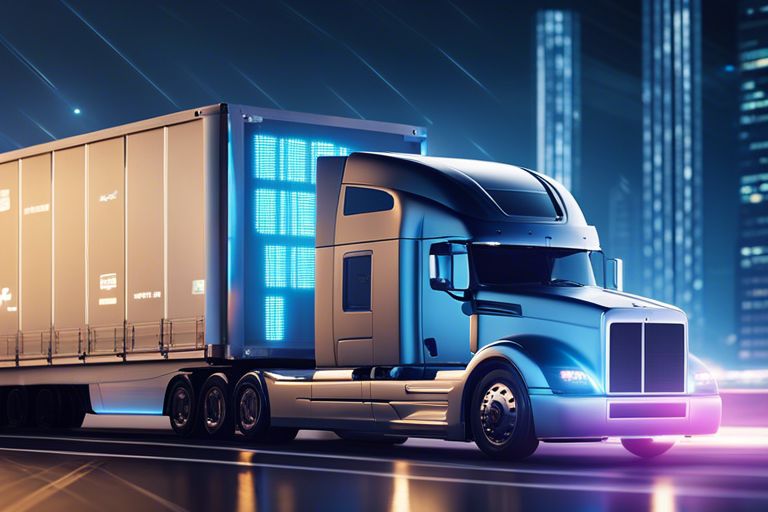In today’s cutting-edge world, technological advancements have drastically altered the landscape of the trucking industry. The emergence of advanced digital solutions has revolutionized the way freight brokerage operates, redefining how you manage your trucking business. From improving efficiency and safety to streamlining operations, the impact of technology in trucking is undeniable. As a result, it is crucial for you to stay informed about the latest trends and innovations in order to stay competitive in the ever-evolving industry of freight brokerage. This blog post will explore the significant ways in which technology has impacted trucking and how you can leverage these advancements to enhance your business operations.
Key Takeaways:
- Increased efficiency: Technology has greatly improved the efficiency of trucking operations through real-time tracking, digital documentation, and automated processes.
- Enhanced transparency: The use of technology in freight brokerage has allowed for greater transparency in the supply chain, providing shippers and carriers with visibility into the movement of goods.
- Improved customer experience: By leveraging technology, freight brokers can provide better customer service, streamlined communication, and faster response times, ultimately enhancing the overall customer experience in the trucking industry.
1. Technology has revolutionized the trucking industry.
2. Freight brokerage is adapting to technological advancements.
3. Real-time tracking and transparency are now possible.
4. Automation is streamlining logistics operations.
5. Digital platforms are connecting shippers and carriers.
6. Efficiency and cost savings are driving the industry forward.
Technological Innovations in Freight Brokerage
Some of the most significant changes in the freight brokerage industry have been brought about by technological innovations. These advancements have revolutionized the way that freight is managed, tracked, and delivered, leading to greater efficiency and cost savings for both carriers and shippers.
Digital Freight Matching Platforms
One of the most impactful technological developments in freight brokerage is the rise of digital freight matching platforms. These platforms utilize advanced algorithms to match available trucks with loads that need to be transported, streamlining the process of finding and booking shipments. With the ability to instantly connect carriers with shippers, digital freight matching platforms have significantly reduced the time and effort required to secure freight, improving overall efficiency and reducing empty miles. In addition, these platforms often include features such as real-time tracking and electronic documentation, providing greater visibility and transparency throughout the shipping process.
The Role of Big Data and Analytics
Another key technological innovation in freight brokerage is the use of big data and analytics to optimize operations. By leveraging large volumes of data, freight brokers can gain valuable insights into market trends, carrier performance, and shipment patterns. Analytics tools allow you to make more informed decisions when it comes to selecting carriers, forecasting demand, and pricing shipments, ultimately leading to improved efficiency and cost savings. Additionally, the use of big data enables freight brokers to identify potential risks and opportunities within the market, allowing for more proactive and strategic decision-making.
Automation in Trucking Operations
For freight brokers, the advent of technology has brought about rapid changes in the industry. With the rise of digital freight brokers, there has been much speculation about their potential to disrupt traditional freight brokerage. However, according to ‘Why digital freight brokers might fail to disrupt the freight brokerage industry’, there are still some limitations that are preventing them from fully replacing traditional brokerage services.
Automated Carrier Selection and Pricing
One of the key advancements in trucking operations due to technology is the automation of carrier selection and pricing. With the help of digital platforms and algorithms, you can now easily find and select carriers based on their availability, pricing, and reliability. This has significantly reduced the time and effort it takes to find the right carrier for your shipments. Additionally, automated pricing tools can help you quickly analyze market rates and make real-time pricing decisions, ensuring that you are able to secure the best rates for your customers. This level of automation not only saves you time but also allows you to make more informed decisions that benefit your business.
The Rise of Autonomous Trucks
Another major advancement that is reshaping the trucking industry is the rise of autonomous trucks. While fully autonomous trucks may still be in the development stages, the impact they will have on the industry is undeniable. By introducing self-driving trucks, you can expect to see significant improvements in efficiency, safety, and cost savings. However, it is important to note that the rise of autonomous trucks also brings about concerns regarding job displacement and the need for new regulations and infrastructure. Despite these challenges, the potential benefits of autonomous trucks cannot be overlooked, as they have the potential to revolutionize the way goods are transported.

The Impact of Technology on Carrier Relationships
To remain competitive in the freight brokerage industry, it’s important to understand the impact of technology on carrier relationships. With the rise of digital platforms and innovative tools, technology has revolutionized the way freight brokers and carriers interact and conduct business. In this chapter, we’ll explore how technology has transformed carrier relationships and what it means for you as a freight broker.
Enhancing Communication and Transparency
One of the most significant impacts of technology on carrier relationships is the enhancement of communication and transparency. Digital platforms and real-time tracking systems have allowed for seamless communication between brokers and carriers. With instant updates on shipment statuses and delivery times, you can provide your carrier partners with real-time visibility into the progress of their shipments, resulting in improved trust and relationships. Additionally, the transparency provided by technology allows for clear documentation of transactions and deliveries, minimizing disputes and increasing accountability.
Streamlining Onboarding and Compliance Processes
Another key impact of technology on carrier relationships is the streamlining of onboarding and compliance processes. Through digital platforms and automated systems, you can easily verify carrier credentials and track compliance with industry regulations. This not only saves you time and reduces administrative burden, but it also ensures that you are working with reputable and compliant carriers. By leveraging technology to streamline these processes, you can minimize risk and ensure that your carrier partnerships are strong and reliable.

The Role of Mobile Technologies in Freight Brokerage
Now more than ever, mobile technologies play a crucial role in the freight brokerage industry. These advancements have revolutionized the way businesses in the trucking industry operate. From fleet management to real-time tracking, mobile technologies have brought about significant changes in the way freight brokerage is conducted.
Mobile Apps for Fleet Management
With the use of mobile apps for fleet management, you have the ability to effectively organize and track your fleet, improving efficiency and reducing operational costs. These apps provide you with real-time information on your drivers’ locations, allowing you to better plan and optimize their routes. Through these apps, you can also monitor fuel consumption, vehicle maintenance, and driver performance, ultimately leading to better decision-making and improved overall performance of your fleet.
Real-Time Tracking and Visibility
Real-time tracking and visibility are essential components in today’s freight brokerage industry. With the use of mobile technologies, you have the capability to track shipments in real time, providing you with immediate updates on the status and location of your cargo. This level of visibility enables you to accurately predict delivery times, proactively address any potential issues, and keep your customers informed every step of the way. Real-time tracking and visibility not only enhance the overall customer experience but also improve the security and safety of your shipments.
Regulatory and Security Considerations
Unlike in the past, the freight brokerage industry is now heavily reliant on technology to streamline operations and increase efficiency. According to a recent article by Allied Market Research, the future of digital freight brokerage lies within automation and artificial intelligence, which are changing the way freight is brokered and transported.
Future of Digital Freight Brokerage Lies Within Automation … The increasing prevalence of digital platforms in the freight brokerage industry has raised concerns about regulatory compliance and security. As a freight broker, it is crucial to consider these factors to ensure the smooth functioning of your operations and to protect your business from potential risks.
Compliance with Electronic Logging Devices (ELDs)
One of the most important regulatory considerations for freight brokers is compliance with Electronic Logging Devices (ELDs). The Federal Motor Carrier Safety Administration (FMCSA) has mandated the use of ELDs to track drivers’ hours of service and ensure compliance with driving time regulations. Failure to comply with ELD requirements can result in severe penalties, including fines and potential loss of business. As a freight broker, it is essential to ensure that the carriers you work with are equipped with ELDs and are using them in accordance with the law. This not only protects your business from liability but also contributes to overall safety and compliance within the industry.
Cybersecurity Concerns in Freight Tech
Another critical consideration for freight brokers is cybersecurity. With the increasing use of digital platforms and technology in the industry, the risk of cyber threats and data breaches has become a significant concern. Your business, as well as the sensitive information of your clients and carriers, are at risk if proper cybersecurity measures are not in place. It is essential to invest in robust cybersecurity solutions to safeguard your data and prevent unauthorized access to your systems. Additionally, educating your team about cybersecurity best practices and implementing ongoing monitoring and updates can help mitigate the risk of cyber threats and ensure the integrity of your operations.
Understanding and addressing regulatory and security considerations in freight brokerage is vital for the success and sustainability of your business. By prioritizing compliance with regulations such as ELD requirements and implementing strong cybersecurity measures, you can protect your business from potential risks and contribute to the overall safety and security of the freight industry.
The Environmental and Social Implications
Your role as a freight broker involves more than just managing loads and transactions. It also entails a responsibility to consider the environmental and social implications of the trucking industry. With the impact of technology on trucking, there are both positive and negative effects that you need to be aware of.
Reducing Carbon Footprint through Route Optimization
One of the key benefits of technology in trucking is the ability to reduce carbon footprint through route optimization. By using advanced software and GPS tracking, you can plan more efficient routes that minimize fuel consumption and emissions. This not only saves you money on fuel costs but also demonstrates a commitment to environmental sustainability. It’s important to leverage these tools to not only benefit your bottom line but also contribute to a healthier planet for future generations.
The Effect of Technology on Trucking Employment
On the other hand, the advancement of technology in trucking also raises concerns about the impact on employment in the industry. With the introduction of autonomous vehicles and automation in logistics, there is a potential for job displacement among truck drivers and other workers. It’s essential to stay informed about these developments and consider how they may affect your business and the broader trucking community. By understanding the potential challenges, you can proactively adapt and prepare for the future of the industry.

Future Trends and Predictions
After investigating the current state of freight brokerage and the impact of technology on trucking, it’s important to consider future trends and predictions that could shape the industry. The transportation industry is constantly evolving, and staying ahead of the curve is essential for success. By anticipating these trends, you can position yourself to take advantage of emerging opportunities and minimize potential threats to your business.
Integration of Blockchain in Freight Brokerage
Blockchain technology has the potential to revolutionize the freight brokerage industry. By providing a secure and transparent platform for transactions, blockchain can streamline processes, reduce costs, and eliminate middlemen. This technology can offer a higher level of security and trust, enabling real-time tracking of shipments, reducing paperwork, and ensuring accurate and prompt payments. The integration of blockchain in freight brokerage will not only enhance efficiency but also provide a more reliable and secure environment for all stakeholders involved in the transportation process.
The Advancement in Electric and Hydrogen-Powered Trucks
The advancement in electric and hydrogen-powered trucks is set to transform the trucking industry. These alternative fuel vehicles are not only environmentally friendly, but also cost-effective in the long run. As the push for greener transportation options continues, the adoption of electric and hydrogen-powered trucks is expected to increase. This shift towards sustainable transportation solutions can significantly reduce your carbon footprint and operational costs while complying with increasingly stringent environmental regulations. Incorporating these technologies into your fleet can enhance your sustainability efforts and improve your overall business image.
Conclusion
Ultimately, the impact of technology on trucking has revolutionized the freight brokerage industry, making it more efficient and transparent than ever before. With the ability to track shipments in real time, optimize routes, and automate various processes, you can now streamline your operations and provide better service to your customers. The use of technology has also allowed for the implementation of predictive analytics, which can help you better anticipate market trends and make more informed business decisions. Overall, embracing technology in freight brokerage has the potential to significantly boost your productivity and profitability.
Freight Brokerage 101: The Impact of Technology on Trucking
Q: What is freight brokerage and how does it relate to the trucking industry?
A: Freight brokerage involves the coordination and facilitation of the transportation of goods between shippers and carriers. It plays a crucial role in the trucking industry by matching shippers with carriers to efficiently move freight from one location to another.
Q: What impact has technology had on the trucking industry and freight brokerage?
A: Technology has revolutionized the trucking industry and freight brokerage by introducing digital platforms, tracking systems, and data analytics that streamline operations, improve efficiency, and increase transparency in the transportation process.
Q: How has the introduction of digital platforms affected freight brokerage?
A: Digital platforms have transformed the way freight brokerage operates by enabling real-time communication, automated booking and dispatching, and improved visibility into the status of shipments. These platforms have significantly enhanced the efficiency and speed of freight matching and tracking.
Q: What role does data analytics play in freight brokerage?
A: Data analytics has become a powerful tool in freight brokerage, providing insights into market trends, carrier performance, and route optimization. By leveraging data, freight brokers can make informed decisions that drive cost savings and operational improvements.
Q: How does technology improve the overall efficiency of the trucking industry?
A: Technology has streamlined the entire trucking process, from load matching and dispatching to tracking and delivery. This streamlined process reduces empty miles, minimizes waiting times, and ultimately increases the overall efficiency of the trucking industry.
Q: What are the benefits of technology integration for carriers and shippers in the trucking industry?
A: Technology integration has provided carriers and shippers with increased visibility, improved load planning, reduced administrative burdens, and enhanced communication, leading to more reliable and cost-effective transportation solutions.
Q: How will future advancements in technology continue to impact freight brokerage and the trucking industry?
A: Future advancements in technology are expected to further optimize freight brokerage and the trucking industry by introducing predictive analytics, automation, electrification, and autonomous trucking, all of which will continue to drive efficiency, sustainability, and innovation in transportation logistics.